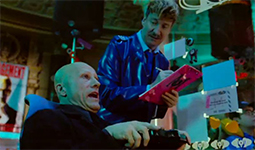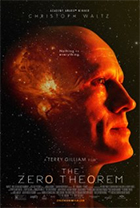The Zero Theorem
|  Terry Gilliam’s latest off-beat mind-bender, The Zero Theorem, harkens back both subtly and overtly to Brazil (1985), his disastrously mismanaged masterpiece about bureaucratic nightmare and political terrorism. Like that film, The Zero Theorem is set in an odd, vaguely recognizable corporate-dominated near future in which all of our society’s worst tendencies have grown to the point of sheer absurdity, which here take the form of roving targeted commercials that follow you down the street and an obsession with being plugged in that tends to render most human contact irrelevant (or at least superfluous). This is especially true for the film’s closed-off protagonist, a bald oddball named Qohen (pronounced “Cohen”) Leth (Christoph Waltz) who lives a solitary life of deep introversion, speaks of himself in the royal “we” for no discernible reason, and has come to believe that someday he will receive a phone call that will explain his life’s purpose. Terry Gilliam’s latest off-beat mind-bender, The Zero Theorem, harkens back both subtly and overtly to Brazil (1985), his disastrously mismanaged masterpiece about bureaucratic nightmare and political terrorism. Like that film, The Zero Theorem is set in an odd, vaguely recognizable corporate-dominated near future in which all of our society’s worst tendencies have grown to the point of sheer absurdity, which here take the form of roving targeted commercials that follow you down the street and an obsession with being plugged in that tends to render most human contact irrelevant (or at least superfluous). This is especially true for the film’s closed-off protagonist, a bald oddball named Qohen (pronounced “Cohen”) Leth (Christoph Waltz) who lives a solitary life of deep introversion, speaks of himself in the royal “we” for no discernible reason, and has come to believe that someday he will receive a phone call that will explain his life’s purpose.Like Sam Lowry in Brazil, Qoohen begins the film as a drone, working anonymously as a computer minion for Mancom, a techno-giant corporation whose name suggests the final and permanent merging of humanity and telecommunications technology. His immediate superior, Joby (David Thewlis), is a goofy chatterbox who takes a liking to Qoohen despite his deep introversion, which leads to his being tasked by Management (Matt Damon), Mancom’s corporate overlord, to spend all his time trying to crack the so-called Zero Theorem, a mathematical formula that will supposedly clarify whether or not there is any meaning in existence. Working on the Zero Theorem is an all-encompassing occupation that has burned out numerous other programmers, so Qohen locks himself away in his house (which happens to be a burned-out church) and spends all his waking hours trying and failing to make it work (working on the theorem is visualized like a particularly exasperating three-dimensional game of Tetris in which putting one block in place might cause an avalanche of other blocks). To stay sane (somewhat, anyway), he is required to meet regularly with a psychological artificial intelligence called Dr. Shrink-Rom (Tilda Swinton, playing a variation on the same haughty British cartoon she played in Snowpiercer). Of course, someone on a computer trying to crack an insanely complicated mathematical equation is not a particularly cinematic subject, so the film supplies a number of diversions in the form of secondary characters who work to bring Qohen out of his shell, as it were, and in the process help him reclaim some of his humanity (if the film has a point to make about the here and now, it is that we need to get away from our many screens from time to time and interface with the flesh and blood around us). One of these characters is Bainsley (Mélanie Thierry), a gregarious beauty that Mancom pays to engage Qohen in real human interaction, although ironically they truly make a connection when they plug into virtual reality suits together and find themselves on a cartoonish beach. Another is Bob (Lucas Hedges), Management’s 15-year-old son who is already a brilliant computer hacker and partners with Qohen in trying to crack the Zero Theorem, but whose real purpose is to act as a kind of unbridled Id to Qohen’s lockdown Super Ego. Outside of the zany visual world Gilliam concocts in collaboration with production designer David Warren (with whom he previously collaborated on The Imaginarium of Doctor Parnassus) and art director Adrian Curelea, one of the film’s chief pleasures is watching Waltz play a character for whom words are difficult, which is quite an experience after having watching him in his back-to-back Oscar-winning roles as hyper-articulate scene stealers in Quentin Tarantino’s Inglourious Basters (2008) and Django Unchained (2012). Waltz twitches nervously and holds his body in such a way that suggests he is literally trying to draw up inside himself, and despite the numerous obstacles to identification, he comes across as strangely sympathetic. Perhaps the best thing about Waltz’s performance is the way he subtly suggests that Qohen has truly lost something about himself (“We are dying,” he says several times in the film), which poses the intriguing notion that he might be able to get it back. Unfortunately, like a number of Gilliam’s films, The Zero Theorem starts to come apart at the seams in the final third, which may very well be the point in a narrative about trying to answer “The Meaning of the Universe.” The film is clearly meant to play as social satire, with barbs aimed at our techno-culture, our surrender to corporate interests, and the dissolution of genuine thought in the face of cheap pleasures and kooky religious diversions, and at times those barbs land with pin-prick accuracy. Yet, Gilliam, working from a script by first-time screenwriter Pat Rushin, must ultimately resort to vague fantasia and too-clever ambiguity to arrive at the film’s conclusion, which on the one hand can be read as the unavoidable endpoint of a philosophical conundrum that has perplexed humanity for its entire existence, but on the other hand feels like a bit of a cheap out. Copyright ©2014 James Kendrick Thoughts? E-mail James Kendrick All images copyright © Amplify |
Overall Rating: 

 (3)
(3)


